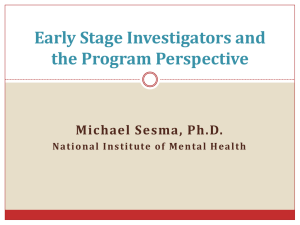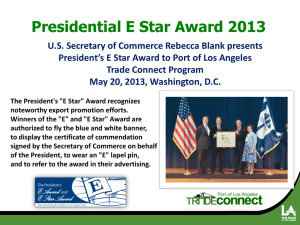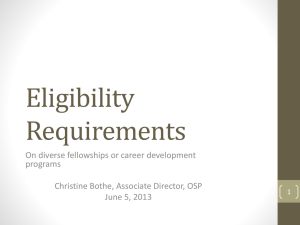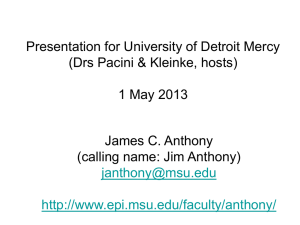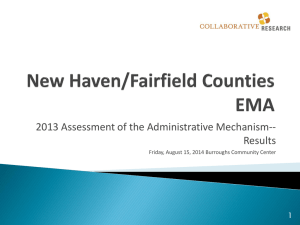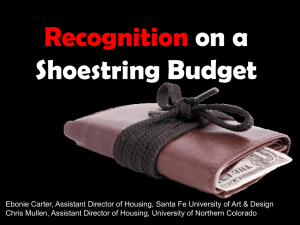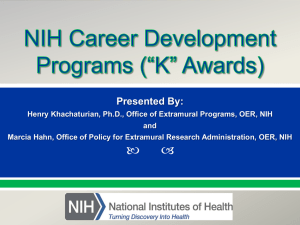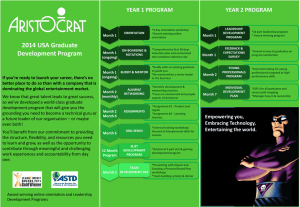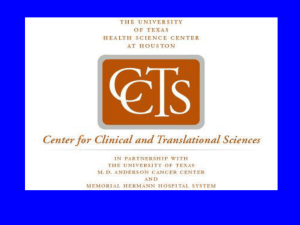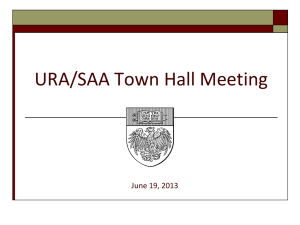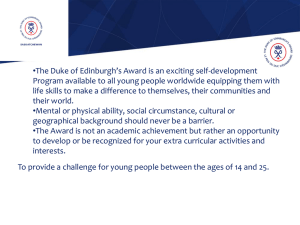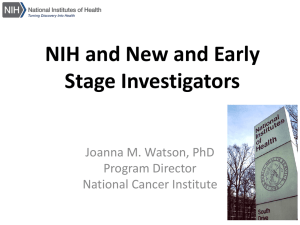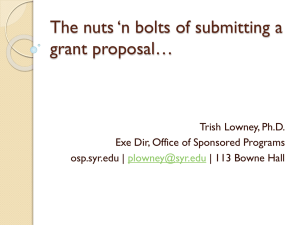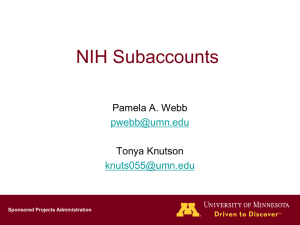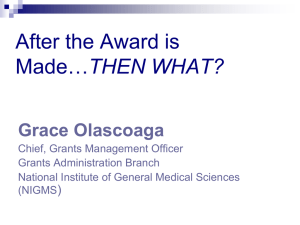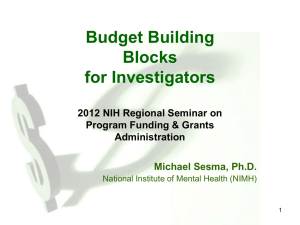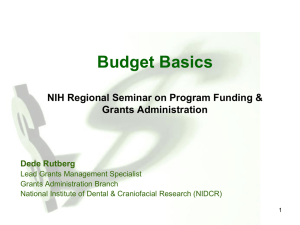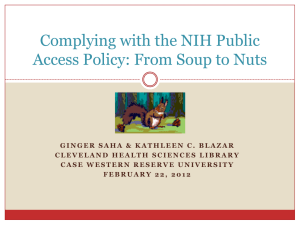Successful Grant Writing* A Process
advertisement
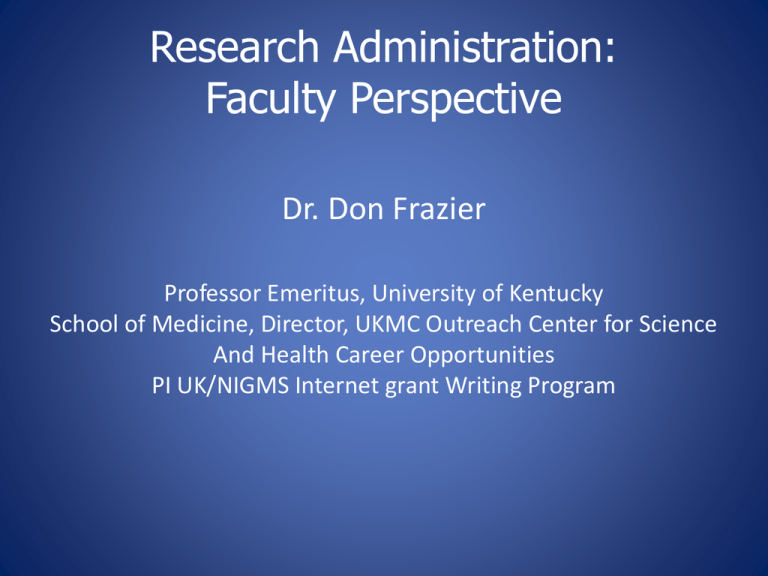
Research Administration: Faculty Perspective Dr. Don Frazier Professor Emeritus, University of Kentucky School of Medicine, Director, UKMC Outreach Center for Science And Health Career Opportunities PI UK/NIGMS Internet grant Writing Program Perception • Perception Reality • Hurtle: Barrier Team mate Why Should I Apply for a Grant? • Grants allow you to… – – – – – Achieve your intellectual and programmatic goals Implement change in your institution or environment Advance your field Travel to carry out your work Get resources/assistance with your current activities What we know….. • “Grantsmanship is a scholarship activity and • Grantsmanship is a learned skill” • 1st rule: Start Early Pre-Submission How to get started “Where do you fit in?” The Process Begins Good Idea Good Idea Significant? Does it address an important problem How will scientific knowledge be advanced Innovative? Builds upon or expands knowledge base Capable of making a difference Understandable? Can you help? The Idea – Research Plan • 1. Fits with expertise and facilities • 2. Research the literature –Any role here? Funding Opportunity Announcements • All applications must be submitted in response to an active FOA NOT-0D-10-134 Federal or Foundation Questions to be addressed • What granting agencies funds my area of research? • How do I get a copy of their mission statement and guidelines? • Where do I find the application forms? • What do they want? How and who will evaluate the merit of my proposal? • NOW I CAN START TO WRITE!! How can my office help? 1. Develop a data-base of your Faculty’s research interests /student development 2. Cross-match funding opportunities (FOA’s) with faculty – Federal/Foundation/State/ etc. 3. Send alerting emails to appropriate faculty Sources of Information • Government publications and web sites • Foundations and corporations publications and web sites • Professional societies and organizations • Generic source guides – books and electronic databases • Journal articles • Lists and abstracts of funded projects – (Caution: sponsor priorities do change) • Professors/colleagues/mentors Example: Federal Agencies NIH/NSF Grants.gov How to find Funding Opportunities and Download Applications Utilizing Grants.gov and the NIH Guide What is Grants.gov • Federal government’s single on-line portal to find and apply for Federal grant funding • Utilized by all 26 Federal grant-making agencies • NIH system that allows applications/grantees to electronically receive and transmit application and award information Finding an Opportunity – Grants.gov • • • • • Locate and learn More about funding Opportunities in a Standardized Manner. • • • Sign up to receive New grant postings by email. Full Announcement – about the funding opportunity will contain all important information The RePROTER Database • A Federal resource • An On-Line Resource for Research Administrators and Faculty • Developing Proposals to NIH and other DHHS Agencies RePORTER Database • • • • • • • National Institutes of Health (NIH) Agency for Health Care Research and Quality (AHRQ) Centers for Disease Control and Prevention (CDCP) Food and Drug Administration (FDA) Health Resources and Services Administration (HRSA) Office of Assistant Secretary of Health (OASH) Substance Abuse and Mental Health Administration (SAMHSA) Search RePORTER Database for Funded Projects Information Determine if specific projects have been funded as well as the funding mechanisms (e.g., R01, R03, R21, K01, K99) Identify potential competitors and/or collaborators Criteria to Evaluate Each Funding Source- How can you help me? • Objectives/Priorities of the agency – key is FIT • Eligibility – Institution (e.g., 501 (c)3, faith-based organization) – Individual (e.g., US citizen, minority, Hispanic, female, graduate student, new investigator, mid-career researcher) • Type of project – e.g., fellowship/scholarship, training grant, research support, construction, travel to collections • Application process – e.g., letter of inquiry, phone call, pre-proposal, full proposal • Read the guidelines! NIH Types of Grant • • • • • • • • • • • • C’s – Construction grant D’s – NIH Director’s Programs (varied topics E’s – Health Professor F’s – Fellowships G’s – Resource Programs * (G11 – Brad – ERDAG12 – PhD Programs) H’s – Community Source Programs K’s – Research Career Development P’s – Research Program Project* » P20 [Exploratory Grant – new Programs – Centers] R’s – Research Projects – Individual (R03, R-15, R21)* S’s – Research Related (S06, S11, S21, SC1 [R01], SC2 [Pilot], SC3)* T’s – Training Program U’s – Collaborative Agreement Funding Opportunities Some Options to Consider (by applicants at selected institutions) Academic Research Enhancement Award (AREA) – Parent R 15 Support of Competitive Research (SCORE) Program -Research Advancement Award (SC1) - Pilot Project Award (SC2) - Research Continuance Award (SC3) Additional Options Open to all Institutions • Small Grant (R03) • Exploratory/Developmental Research Grant (R21) • Career Development Awards – K-Awards Across Institutions and Careers http://grants.nih.gov/training/careerdevelopmentawards. htm AREA Program (R15) Features • Institutional Eligibility – Must offer baccalaureate or advanced degrees in healthrelated sciences. – If an institution has multiple schools, an individual college that has received no more than $6 million per year from NIH in each of 4 of the last 7 years is eligible. • Principal Investigator (PI) Eligibility – PI must have primary faculty appointment at AREA-eligible institution. – PI may not be PI of active NIH research grant at time of AREA award. – PI may not be awarded more than one AREA grant at a time. AREA Program • Purpose – Support small-scale research projects by faculty at eligible, domestic institutions – Expose students to meritorious research projects – Strengthen the research environment of applicant institution • Participating Institutes, Centers, and Offices – Almost NIH-wide (22) R15 Features • Project period limited to 3 years. • Direct costs limited to $300,000 over entire project period. • Deadline – NIH’s standard dates apply, by 5:00 p.m. local time of applicant institution. • Grants are renewable. • Preliminary data are not required. • Proposal should include plans to expose students to hands-on research, but no didactic or training plans because this is a research award. • Parent R15 guidelines – http://grants.nih.gov/grants/guide/pa-files/PA-12006.html SCORE (SC1, SC2, SC3) Program • The SCORE Program is a developmental program designed to increase the research competitiveness of faculty at minority-serving institutions and institutions with a historical mission of training students from backgrounds underrepresented in biomedical research. • Institutional Eligibility: – historical mission of educating students from diverse backgrounds underrepresented in biomedical and behavioral research (i.e., African Americans, Hispanic Americans, American Indians, Alaska Natives, Native Hawaiians, U.S. Pacific Islanders, and persons with disabilities). – award science degrees to undergraduate and/or graduate students. – have received less than $6 million from NIH R01 support in last two fiscal years. SCORE Program Three Individual mechanisms (investigator-initiated) with distinct funding levels for the different developmental levels of PIs: – SC1 (PAR-13-069) – Research Advancement Award – SC2 (PAR-13-070) – Pilot Project Award – SC3 (PAR-13-071) – Research Continuance Award (http://www.nigms.nih.gov/Training/MBRS/SCOREDescription.htm) Deadlines: March 4, 2013; May 25, 2013; September 25, 2013 by 5:00 PM local time of applicant organization. Eligible faculty may only apply/hold one SCORE individual award. Eligible institutions may only apply/hold a maximum of 20 SCORE awards. SCORE Program PI eligibility: Only full time faculty on regular professorial appointments may apply for SCORE awards. See SCORE frequently asked questions: http://www.nigms.nih.gov/Training/MBRS/SCOREUpdateFAQ.htm . Fully developed faculty with a track record of external support (other than MBRS) and publications are ineligible to apply for SCORE individual awards. Faculty currently receiving other developmental or external support are ineligible to apply for any SCORE individual award. SCORE Award Summary SC1 Research Advancement Award SC2 Pilot Project Award SC3 Research Continuance Award Programmatic Goals Foster the transition to major non-SCORE support Allows beginning PIs to generate preliminary data to establish a new line of research Allows PIs conduct projects of limited scope and publish Max Direct Costs (Modular Budgets) $250 K/yr $100K/yr Not to exceed $300K for entire project period $75K Not to exceed $300K for entire project period Duration 4 years Renewable, unless PI has received one cycle of R01 or R21 during professional career 3 years NOT renewable 4 years Renewable Common Requirement PI’s development objectives and plan to achieve them must be provided. No Co-PIs Other Requirements PI must have a mentor and a mentoring plan SCORE Program Overview Advanced Investigators Seeking to transition to Non-SCORE support SC2 Pilot Project Award (Nonrenewable) Beginning Investigators SC1 Research Advancement Award (renewable) SC3 Research Continuance Award (renewable) Investigators at intermediate stages of development seeking support for projects of limited scope RO1 or other external support SCORE Program – New Requirement Institutional Information • Evidence of institution's historical mission to educate students from backgrounds nationally underrepresented in biomedical and behavioral research, and efforts to provide services to the underserved community. • Total NIH R01 support in the last fiscal year. • Institutional data on: – Last academic year’s demographics of student body in the sciences – enrollment, graduation numbers, and percentages of the different groups nationally underrepresented in biomedical and behavioral research. – Number of underrepresented students graduating from the applicant institution who have gone on and completed the Ph.D. in biomedical and behavioral in the past ten years. (Use NSF WebCaspar at https://webcaspar.nsf.gov/). • Institutional letter certifying the time and effort requested by the PI will be provided. Letter must explain also the institution's commitment to the PD/PI's proposed research development. New and Early Stage Investigator Policy • Early stage Investigator – within 10 years of terminal degree or medical residency • Support new investigators at rates comparable to those for established investigators submitting new R01s • Cluster applications from new investigators for review and discuss first at study section meeting “IDEA Development Award” • Career for Biomedical Research Excellence -COBRE• IDEA Networks of Biomedical Research Excellence -INBRE- Institutional Development Award Message to your Faculty • Lack of good project/mission fit usually results in rejection! Analyze the match (your goals – their needs) • What’s in it for the sponsor? • How does your project accomplish the sponsor’s goals? • Why would the sponsor want to “buy” your idea? Link project objectives and activities closely to sponsor goals. • What else has the sponsor funded? Review abstracts/successfully funded proposals. What kinds of organizations were the awardees? What similarities does your organizations share? Explore the “non-obvious” sponsors! Elements of Grant Success Good ideas Good reviewers Good timing Good luck Good presentations Good Grantsmanship Good Timing is NOT “I plan on submitting a grant application in two weeks..can you tell me who might be a good program person for me to speak with before I send my application in?” “We could become a Barrier!”…… Start Early! Summary • Services you can provide meRequired Funding opportunities - FOA’s, matched to my expertise Sponsor “Guidelines” – check Budget Preparation – allowed/disallowed cost share, etc. Certifications – IACUA, IRB, DUNS number, and a host of other regulatory requirements Check List Grant Management And more – i.e., review of my proposal I love my TEAM MATE!!!
